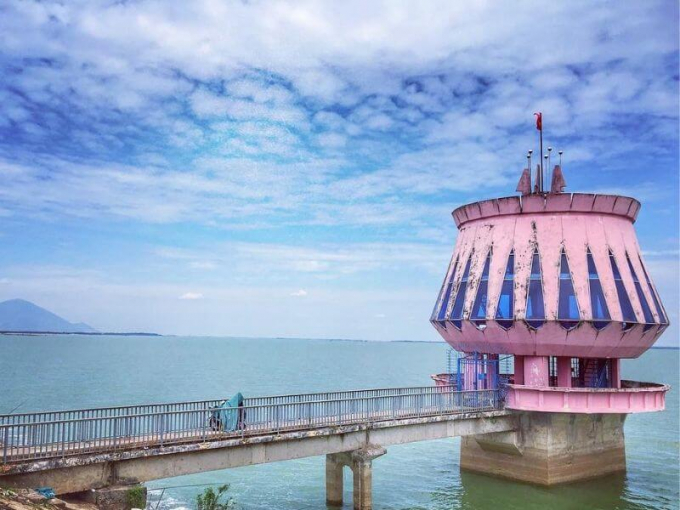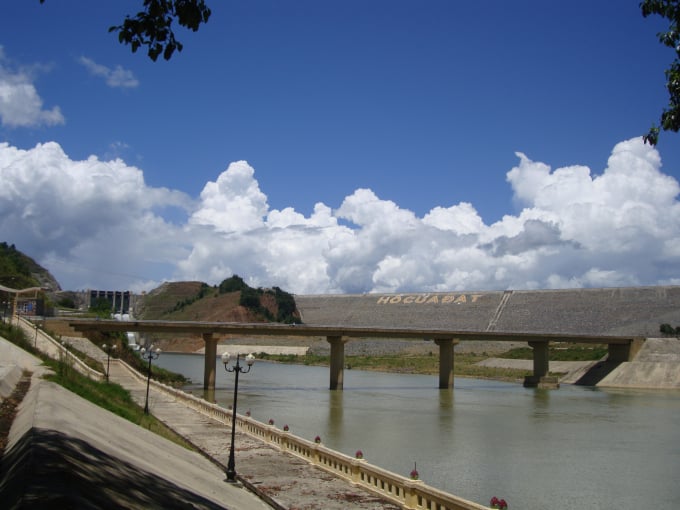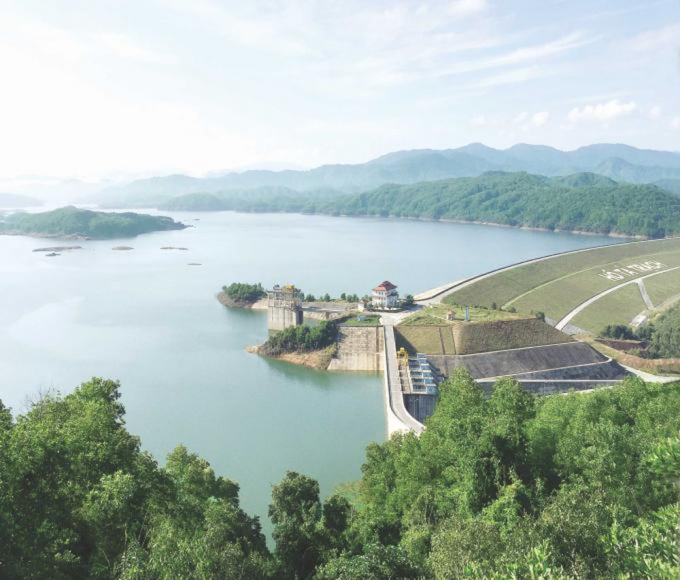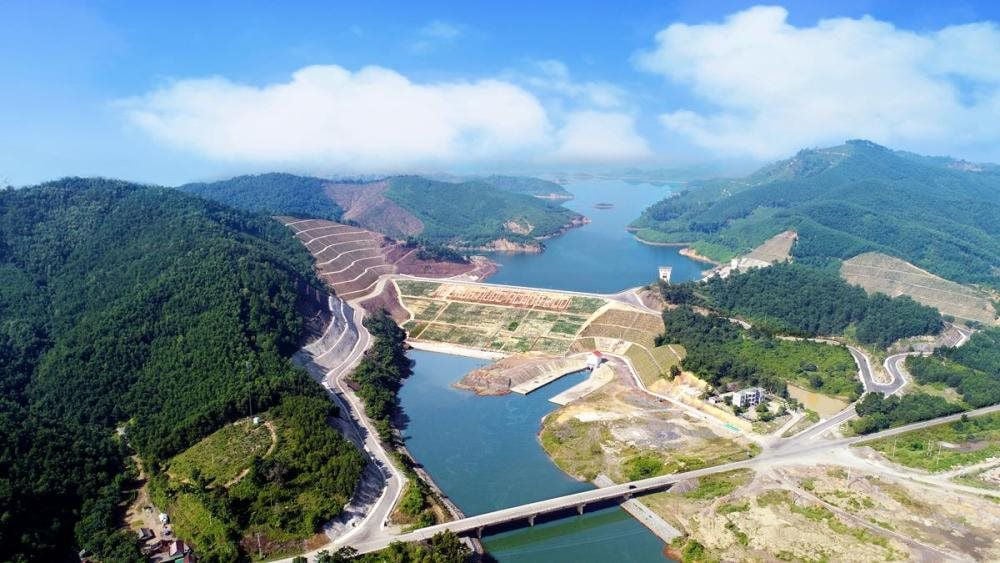May 29, 2025 | 22:18 GMT +7
May 29, 2025 | 22:18 GMT +7
Hotline: 0913.378.918
May 29, 2025 | 22:18 GMT +7
Hotline: 0913.378.918
Upon implementing the Government's regulations on safe management of dams and reservoirs, the MARD has presided over and coordinated with relevant agencies, units and localities to submit to the Prime Minister a list of dams and reservoirs of special importance.
On that basis, in January 2019, the Prime Minister approved Decision No. 124 promulgating the list of dams and reservoirs of special importance, including four structures: Dau Tieng Reservoir (Tay Ninh province), Cua Dat Reservoir (Thanh Hoa province), Ngan Truoi Reservoir (Ha Tinh province), and Ta Trach Reservoir (Thua Thien Hue province).
Dau Tieng Reservoir is the largest irrigation reservoir in the country (158 billion m3), built in 1981, completed and put into operation in 1985. The reservoir is both an especially important structure and an inter-provincial structure serving 5 localities (Tay Ninh, Binh Duong, Binh Phuoc, Long An and Ho Chi Minh City).

Dau Tieng Reservoir (Tay Ninh province).
Dau Tieng Reservoir holds responsible for the irrigation of 63,000 ha, securing water sources for 41,000 ha of land along the Saigon and Vam Co Dong rivers as well as water plants of Thu Dau Mot and Ho Chi Minh City; The reservoirs also help control floods for downstream and make use of lake water for fish farming, pushing the saline boundary below the canals of Tra (Saigon River) and Xuan Khanh (Vam Co Dong River), contributing to reducing the pollution level on the Saigon River and the canal system in the region during the dry season.
Cua Dat Reservoir has a capacity of 1.45 billion m3 and has been put into operation since 2010. Although Cua Dat irrigation structure was built in an area with complicated geological conditions, it is one of the first irrigation structures in Vietnam to apply the stone dam with concrete surface.
Cua Dat Reservoir’s task is to create a stable water source for irrigation of 86,862 ha of arable land, reduce flood with frequency P = 0.6%, ensure water level in Xuan Khanh does not exceed +13.71m (1962 historic flood), supply water for industry and daily life along with power generation (machine capacity N = 97MW); supplement water in the dry season for the lower Ma River to push out salinity and improve the ecological environment.

Cua Dat Reservoir (Thanh Hoa province).
Ta Trach Reservoir has a capacity of 646 million m3, with Hue city at the downstream area (once the capital of Vietnam during the Nguyen Dynasty, having many UNESCO heritage sites).
Ta Trach lake has the task of preventing May-end floods, early floods, and reducing main season floods for the Perfume river system, supply water for domestic and industrial use with flow Q = 2m3/s, create a stable water source for irrigation for 34,782 ha of arable land in the Perfume River Delta. At the same time, Ta Trach Reservoir also adds fresh water to the lower Perfume River to push salinity, improve the environment in the lagoon for aquaculture with the flow Q = 25m3/s; generate electricity with the capacity of installed machinery N = 21MW.
Ta Trach Reservoir has been piloted since 2017. By 2018, the MARD assigned the Irrigation Construction Investment Management Board 5 to be the operator of the project.

Ta Trach Dam and Reservoir (Thua Thien Hue province).
In order to strengthen and complete the unit exploiting irrigation works according to the Law on Irrigation, the MARD has developed a scheme to establish an organization to manage and exploit irrigation structures of special importance, including Cua Dat and Ta Trach reservoirs, and has been approved by the Prime Minister to establish two enterprises with 100% state capital to perform the public tasks.
Ngan Truoi Dam and Reservoir is located in Ha Tinh province with a capacity of 775 million m3, the downstream area of the lake has a North-South 500KV power transmission line, North-South railway line, and Ho Chi Minh trail. These are all important structures related to national security.

An overview of the area of Ngan Truoi Dam and Reservoir (Ha Tinh province).
Ngan Truoi consists of a 363m-long river-blocking dam, with a maximum height of 64.8m, the top of the dam is 12m wide and the secondary dam is 213m long with a maximum height of 26.5m. The structure is responsible for reducing floods for downstream areas, especially in Huong Khe and Vu Quang (Ha Tinh province); supply water and create sources for the existing Linh Cam canal system and the irrigation on about 18,000 ha of arable land; create a water supply source for industrial uses, combined with generating about 15MW of electricity and improving the ecological environment.
Thus, these four irrigation structures of national-level special importance are responsible for countering a diversity of floods in all seasons; supply water sources to secure production (aquaculture, electricity, water for domestic uses,…) and daily life, tremendously improving the ecological environment of the areas.
Translated by Samuel Pham
/2025/05/25/4127-3-073637_820.jpg)
(VAN) Thanks to the promotion from an FAO-implemented project, vegetable production in greenhouses in Moc Chau has seen strong development, from 1.5 hectares in 2021 to nearly 50 hectares in 2024.

(VAN) FAO has recently supported USD 140,000 to implement the project 'Risk mitigation human-animal interface risks through disease control initiatives in pig farming.'

(VAN) The People's Committee of Tra Vinh province has approved an adjustment to the investment policy for the Green Hydrogen Plant project, increasing its area to approximately 52.76 hectares.
![Reducing emissions from rice fields: [2] Farmers’ commitment to the soil](https://t.ex-cdn.com/nongnghiepmoitruong.vn/608w/files/news/2025/05/05/dsc08881jpg-nongnghiep-140632.jpg)
(VAN) Clean rice cultivation model in Thuong Tan commune, Bac Tan Uyen district, is assisting local residents in achieving sustainable agriculture by substantially reducing costs, increasing productivity, and protecting the environment.

(VAN) At the conference to disseminate Resolution No. 68, AgriS introduced its digital agricultural ecosystem and reaffirmed its commitment to accompanying the Government in promoting private sector development and sustainable agriculture.

(VAN) 'Blue Ocean - Blue Foods' initiative is designed to restore marine ecosystems and establish sustainable livelihoods for local communities by cultivating a minimum of 1,000 hectares of cottonii seaweed in the first three years.
/2025/05/21/4642-3-112707_603.jpg)
(VAN) The V-SCOPE project has made direct contributions to three out of six pillars of the Comprehensive Strategic Partnership between Vietnam and Australia.